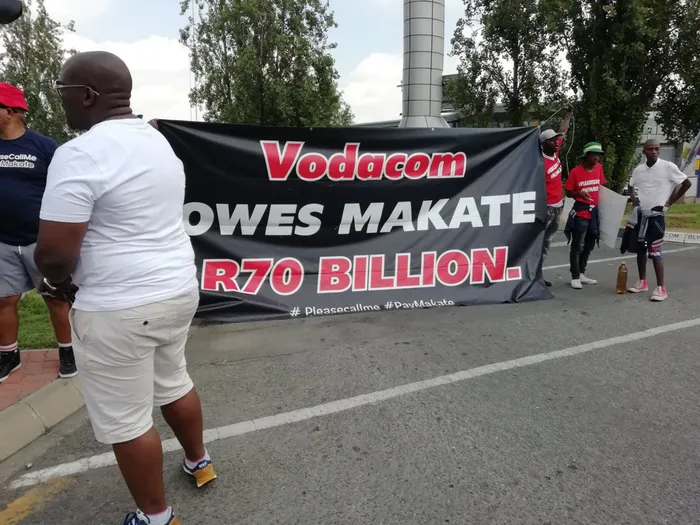Makate vs Vodacom: Court silence sparks outrage over delayed Please Call Me ruling

The fight for justice: #PleaseCallMe Movement's call to action
Image: Siphelele Dludla / independent Newspapers
The #PleaseCallMe Movement (PMC) has written an open letter urging national leaders to step in and resolve the ongoing legal dispute concerning the "Please Call Me" service, as it remains unresolved nearly six months after the Constitutional Court heard the case.
The dispute began in 2000 when Nkosana Makate, then an employee at Vodacom, proposed a service allowing users to notify contacts they were calling without incurring charges.
This simple innovation would generate billions of rand for the telecom giant.
Makate’s efforts to secure fair compensation have spanned over two decades and have resulted in multiple court victories.
His legal journey has resulted in nine judgments in his favour, including three from South Africa’s highest court, the Constitutional Court.
In 2016, the Constitutional Court criticised Vodacom and its executives for unethical conduct, emphasising the importance of recognising Makate’s contribution.
Despite these rulings, a final resolution has remained elusive.
In 2019, the Supreme Court of Appeal ordered Vodacom to pay Makate between 5% and 7.5% of the revenue generated by the service over the past 18 years.
Vodacom appealed, and the case was escalated to the Constitutional Court, which has yet to rule.
The court recently announced that its decision is “reserved,” and no timeline for judgment was provided.
The Open Letter: A Call for Justice and Accountability
The letter underscores how the protracted process damages public trust and undermines the social contract.
“This is unfair. The #PleaseCallMe case illustrates how financial influence can be used to hinder, direct, disregard, and undermine the country's laws.
“It is generally recognised that the issue has been extensively ventilated and Makate has consistently come out on top, with nine favourable decisions — yet the principle of res judicata does not seem to be invoked.”
The letter also criticises the lack of leadership and the growing impatience among supporters.
“We are sitting on the sidelines watching as time goes by. While it seems difficult to reach the end, my worry is the social contract. How are we encouraged to obey the law when publicly observing it being abused like this for so long?”
“We have made it clear from the beginning that our enemy is Vodacom and its arrogant CEO. We worked hard and kept all demonstrations peaceful, raising our frustrations at their premises, the JSE and the Constitutional Court. No incidents of property damage were reported.”
In a candid reflection, the letter asked whether violence would have changed anything.
“Maybe we should have been violent, damaged property, burned tires, blocked streets, looted shops—those are the languages the corporate bourgeoisie understands.
“While Makate is subdued in the legal process, we must ask: Where are the leaders of society—political or otherwise? Why is this man ignored? Are we afraid of losing deals or jobs? Who’s next?”
“To put it into perspective, my child was not yet conceived when PCM was introduced; now she’s a doctor. That’s how long this matter has been dragging on.”
Dunisani Mathiba, from the Office of the Chief Justice, explained that delays are often due to the complexity of cases and the deliberation process.
“There is no set timeframe within which judgments are typically issued. The judges will determine when the judgment is ready.”
Legal analyst Francois Botes pointed to systemic issues hindering timely justice.
“The workload is overwhelming, and vacancies on the bench worsen things. Short-term measures like appointing acting judges help, but are insufficient. Long-term reforms are necessary to address these systemic challenges.”
The #PleaseCallMe Movement’s open letter concluded with a plea for decisive leadership.
“We call on the leaders of this country—political, judicial, and societal—to recognise the importance of this case, not just for Makate but for the integrity of our justice system.
“Justice delayed is justice denied. The longer we wait, the more trust we erode in our institutions. It is time to act and ensure fairness prevails,” read the letter.
thabo.makwakwa@inl.co.za
IOL Politics
Related Topics: